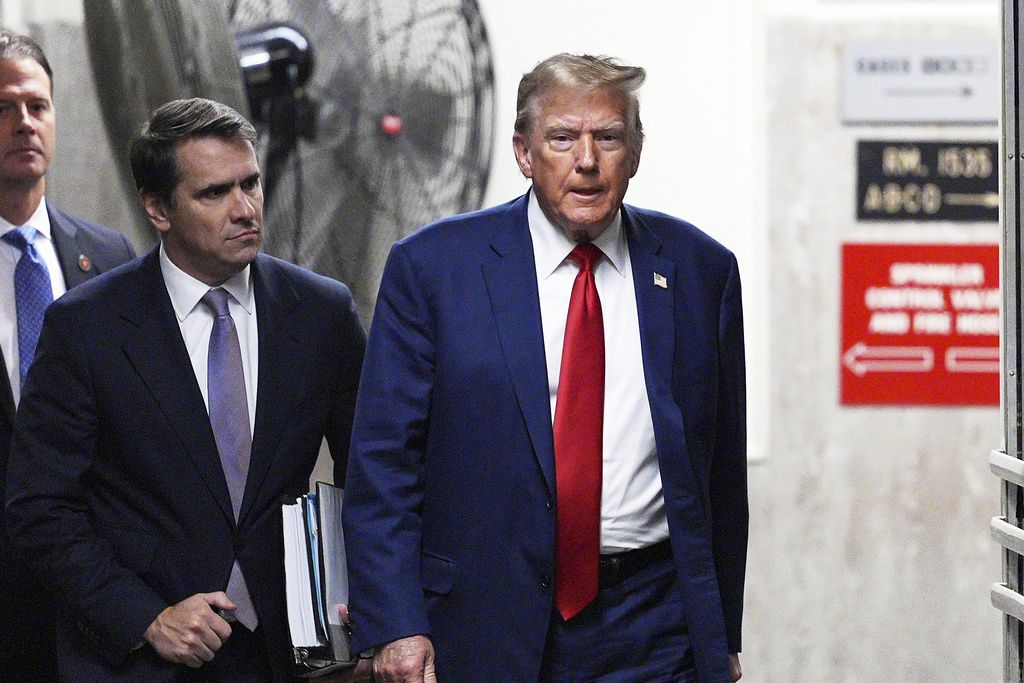

Former President Donald Trump is taking the Supreme Court’s presidential immunity decision and running full speed ahead with it as he seeks to blow up his criminal cases in Washington, D.C., and elsewhere.
Trump’s attorneys are poised to argue that the election interference case in Washington is riddled with unusable evidence based on the high court’s ruling. But they have also brought the immunity decision outside of the nation’s capital, successfully wielding it in Florida and ambitiously arguing it has rendered Trump’s New York conviction unconstitutional.
The Supreme Court ruled on July 1 that some actions by presidents are off-limits from prosecution, but the ruling severely complicated matters for prosecutors by also ruling that certain official actions by presidents cannot be used as evidence against them.
Conservative legal analyst Andy McCarthy, a former federal prosecutor, said the high court’s decision was “expansive” and that the evidence aspect of it “gives Trump a real opportunity.”
“What they’re saying is, ‘We’re not just saying that presidential acts can’t be charged as crimes. What we’re saying is that you can’t use evidence of presidential acts to prove other crimes that might not be immune,’” McCarthy told the Washington Examiner.
Todd Blanche, who is representing Trump in Florida, New York, and Washington, has already indicated that in the latter two cases, part of Trump’s defense strategy is now to excise as much evidence as possible and argue that the charges should be thrown out.
Blanche said in a radio interview Tuesday with Hugh Hewitt that the “entire indictment” brought by special counsel Jack Smith in Washington was “based off of immunized communications and conduct.”
“If the grand jury process was so tainted and was so infected with inadmissible evidence, then certainly, you can make a motion to say the whole thing has to get kicked,” Blanche said. “And I will tell you this: I think that, to those that like to read briefing, I can expect you’ll see such a motion if Jack Smith doesn’t on his own go back and present that case to another grand jury or just walk away, which is what he should do.”
Trump’s defense attorneys have already moved to have Trump’s conviction of falsifying business records in the hush money case in New York tossed out based on the Supreme Court’s ruling, and Judge Juan Merchan is expected to rule on the matter in September.
Trump is set to be sentenced on Sept. 18, but Merchan warned that the date would only stand if a sentence was “still necessary” after the judge decides how to handle evidence that may have been improperly used at trial.
Judge Tanya Chutkan is expected to regain jurisdiction over Trump’s election case in Washington by early August, and legal experts anticipate that she will begin a process of striking pieces of Smith’s indictment that do not align with the Supreme Court’s ruling.
While Blanche’s remarks suggest Trump’s legal team will also move to have the entire case thrown out there, the attorney did not address Trump’s case in Georgia, which has close parallels to the Washington one.
Bradley Moss, an attorney who specializes in national security, predicted that “significant portions” of both election cases would be scrapped.
“The immunity ruling, particularly its conclusions about making information tied to absolutely immune acts inadmissible for use with respect to other acts, makes it likely that significant portions of the D.C. and Fulton County cases will have to be removed,” Moss told the Washington Examiner. “The false electors issue is the best example of a charge that would fall outside the scope of the immunity protection and could be proven with evidence that would remain admissible.”
The case in Georgia is paused for at least the next several months while the state’s appeals court weighs an unrelated argument over whether District Attorney Fani Willis should be disqualified from the case because of a conflict of interest.
Lastly, in Florida, Trump’s legal team saw a massive win this week when Judge Aileen Cannon decided to dismiss Trump’s classified documents case on the grounds that Smith was unlawfully appointed as special counsel.
While Cannon’s decision was not based directly on a presidential immunity claim, Justice Clarence Thomas wrote in a concurring opinion as part of the Supreme Court’s decision that he wanted to “highlight” Smith’s appointment as “another way in which this prosecution may violate our constitutional structure.”
Trump’s attorneys brought this to the attention of Cannon, and when she issued her 93-page decision to drop the charges, she cited Thomas multiple times. Smith is appealing Cannon’s ruling.
Asked about his observations on Trump’s post-immunity ruling responses that are beginning to materialize, McCarthy opined jokingly, “I think the strategy is Trump wins the election.”
CLICK HERE TO READ MORE FROM THE WASHINGTON EXAMINER
Trump, the Republican presidential nominee, has been leading in polls and has been enveloped in support from party leaders after a harrowing assassination attempt on his life over the weekend.
If he wins in November, he could attempt to use his clemency powers to end his two federal cases.





